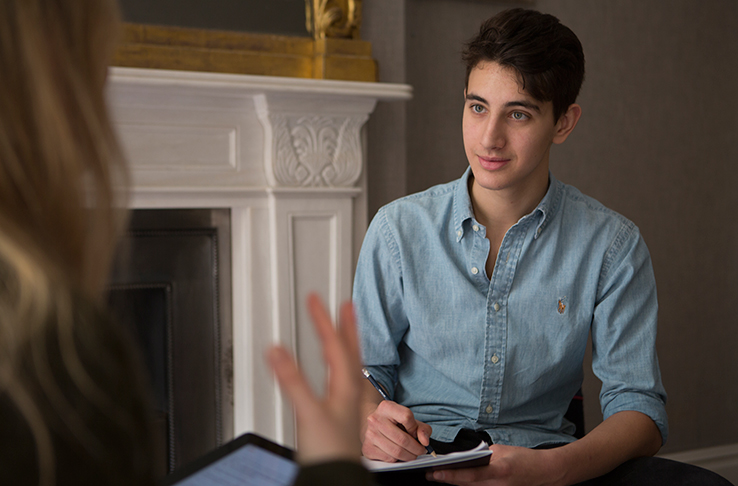Top tips for school interviews
16th January, 2017
Some key points to consider when preparing for a school interview…
An interview is an opportunity.
This is the time for you to begin your relationship with the school you want to go to, it is a chance for the school to get to know you and for you to get to know them. Therefore enjoy it! Keep in mind it is a conversation – not a test that you should arrive at with ready-made answers. Ask yourself: what do I want them to know about me? How can I find a balance between fully answering the questions put to me and using those questions as an opportunity to talk about what I want to talk about?
Be yourself; be positive; sell yourself.
If an interview is about someone getting to know you, it’s important to be yourself. It’s also important to be positive. Having a positive attitude and a willingness to creatively engage in an interview is crucial, because it allows you to properly understand and answer the questions you are asked. Think about how to turn negatives into positives – for example: if you’re asked to say what you’re not good at, be honest, but also say how you’re trying to improve. This will make it easier to deal with questions you might find difficult.

Listen.
If an interview is a conversation, it’s crucial to LISTEN to the other person. It’s very easy to get caught up in thinking about yourself, the impression you’re making and what the ‘right’ answer is – so much so, in fact, that we can forget to properly listen to the questions being answered and end up giving a ‘wrong’ answer. Properly listening is not only a way of answering questions successfully, but also a good way to relax and ease any nerves you might have, because you focus on the other person and genuinely involve yourself in the conversation that you’re having, rather than feeling anxious about what sort of an impression you’re making.
Don’t wait for why; know, think, feel.
Two more things that will help you answer the questions. Don’t wait for the interviewer to ask why, tell them, and, yes, tell them what you KNOW, but also what you THINK and FEEL about whatever it is you’re talking about. What you know in relation to a given question is important, but expressing what you think and what you feel about something often leads to more interesting conversations, and allows the interviewer to get to know you better. Remember that a good interviewer should challenge the interviewee and make them think. It is important to do that to yourself, regardless of what the interviewer does, so that the interviewer sees the best of you.

Don’t let body language get in the way of the conversation.
We are often told to be polite, to make eye contact, to shake hands… but why? Why is all this stuff so important? It’s important because it allows us to communicate better, to feel comfortable in one another’s company. If you sit there fiddling and fidgeting, or looking bored, yawning, your eyes drifting around the room, it is going to be harder for the interviewer to listen to what you are saying, and they’ll be less willing to talk to you. Equally if you sit perfectly still and stare at them intently the whole time, they will probably also feel uncomfortable. Finding the balance is key, if you remember that to make sure that your body language does not get in the way of the conversation, you will manage to.
Be prepared… and keep practising!
You will probably be nervous before the interview, so taking time to focus, be calm and remember all the important things written above before going into the room will be very helpful. Interviewing for schools is definitely not all about going in with ready-made answers that sound rehearsed, but it can be useful to have an idea of what you want to talk about and be prepared for the types of questions you’ll be asked.
Questions loosely fall into the following categories:
- The school you’re applying for (why do you want to come here)
- Subjects and learning (favourite, least favourite)
- You and your family (your hobbies, your beliefs, what do your parents do)
- What would you do if (…you were stranded on a desert island and you could only have one of the …, I gave you a £1,000)
- General knowledge and interest (current affairs, geography, history etc)
- Do you have any questions for me? (what do you genuinely want to know?)
Remember that you are interviewing the school as much as they are interviewing you.
Good luck!